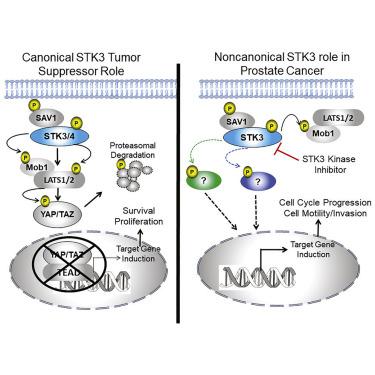Molecular Therapy ( IF 12.4 ) Pub Date : 2021-08-25 , DOI: 10.1016/j.ymthe.2021.08.029 Amelia U Schirmer 1 , Lucy M Driver 1 , Megan T Zhao 1 , Carrow I Wells 2 , Julie E Pickett 2 , Sean N O'Bryne 2 , Benjamin J Eduful 2 , Xuan Yang 2 , Lauren Howard 3 , Sungyong You 4 , Gayathri R Devi 5 , John DiGiovanni 6 , Stephen J Freedland 7 , Jen-Tsan Chi 8 , David H Drewry 9 , Everardo Macias 1

|
Serine/threonine kinase 3 (STK3) is an essential member of the highly conserved Hippo tumor suppressor pathway that regulates Yes-associated protein 1 (YAP1) and TAZ. STK3 and its paralog STK4 initiate a phosphorylation cascade that regulates YAP1/TAZ inhibition and degradation, which is important for regulated cell growth and organ size. Deregulation of this pathway leads to hyperactivation of YAP1 in various cancers. Counter to the canonical tumor suppression role of STK3, we report that in the context of prostate cancer (PC), STK3 has a pro-tumorigenic role. Our investigation started with the observation that STK3, but not STK4, is frequently amplified in PC. Additionally, high STK3 expression is associated with decreased overall survival and positively correlates with androgen receptor (AR) activity in metastatic castrate-resistant PC. XMU-MP-1, an STK3/4 inhibitor, slowed cell proliferation, spheroid growth, and Matrigel invasion in multiple models. Genetic depletion of STK3 decreased proliferation in several PC cell lines. In a syngeneic allograft model, STK3 loss slowed tumor growth kinetics in vivo, and biochemical analysis suggests a mitotic growth arrest phenotype. To further probe the role of STK3 in PC, we identified and validated a new set of selective STK3 inhibitors, with enhanced kinase selectivity relative to XMU-MP-1, that inhibited tumor spheroid growth and invasion. Consistent with the canonical role, inhibition of STK3 induced cardiomyocyte growth and had chemoprotective effects. Our results indicate that STK3 has a non-canonical role in PC progression and that inhibition of STK3 may have a therapeutic potential for PC that merits further investigation.
中文翻译:

Hippo 肿瘤抑制因子丝氨酸/苏氨酸激酶 3 STK3 在前列腺癌中的非规范作用
丝氨酸/苏氨酸激酶 3 (STK3) 是高度保守的 Hippo 肿瘤抑制通路的重要成员,可调节 Yes 相关蛋白 1 (YAP1) 和 TAZ。STK3 及其旁系同源物 STK4 启动调节 YAP1/TAZ 抑制和降解的磷酸化级联反应,这对于调节细胞生长和器官大小很重要。该通路的失调导致 YAP1 在各种癌症中过度激活。与 STK3 的典型肿瘤抑制作用相反,我们报告说,在前列腺癌 (PC) 的背景下,STK3 具有促肿瘤发生作用。我们的调查始于对 STK3(而非 STK4)在 PC 中频繁扩增的观察。此外,高 STK3 表达与总生存率降低相关,并与转移性去势抵抗 PC 中的雄激素受体 (AR) 活性呈正相关。XMU-MP-1 是一种 STK3/4 抑制剂,在多种模型中减缓细胞增殖、球体生长和基质胶侵袭。STK3 的遗传缺失减少了几种 PC 细胞系的增殖。在同种异体移植模型中,STK3 缺失减缓了肿瘤生长动力学体内和生化分析表明有丝分裂生长停滞表型。为了进一步探讨 STK3 在 PC 中的作用,我们鉴定并验证了一组新的选择性 STK3 抑制剂,相对于 XMU-MP-1 具有增强的激酶选择性,可抑制肿瘤球体生长和侵袭。与经典作用一致,抑制 STK3 可诱导心肌细胞生长并具有化学保护作用。我们的结果表明 STK3 在 PC 进展中具有非规范作用,STK3 的抑制可能对 PC 具有治疗潜力,值得进一步研究。


























 京公网安备 11010802027423号
京公网安备 11010802027423号